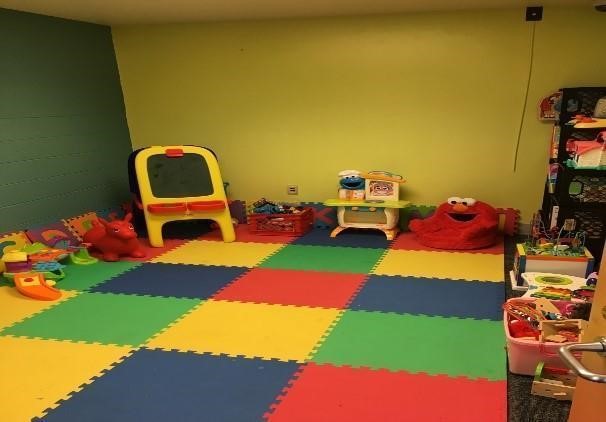Promising Practices
Leveraging Program Success for Culture Change
The Just Beginning Fatherhood (JB) program is a voluntary, structured visitation program. The program gives teenage, justice-involved fathers opportunities to engage and build relationships with their children. Through the program, teenage fathers learn about their roles as parents. Equally important, the program provides staff at the facility with the reward of teaching a curriculum and seeing the benefits firsthand when fathers visit with their children.
The JB program seeks to improve father–child interactions. Evaluations show that among children 3–36 months of age, the program has positive effects on emotional responsivity, warmth, and language stimulation. The program also increases the father’s acceptance of and awareness of his influence on the child’s development (Barr et al., 2011; 2014; Richeda et al., 2015). Evaluations also show that fathers value the time spent with their children, so much so that it acts as an incentive to fathers and encourages their appropriate behavior in custody. For example, rates of behavioral infractions among incarcerated fathers decreased by 50–60% while they were in the JB program (King et al., 2015).
Aside from its positive effects on fathers and their children, the JB program changes the culture of the institutions that adopt it by altering the way staff and teenage fathers interact. Staff see firsthand the efforts that the fathers make to change their behaviors for the benefit of their children. This encourages staff to be more supportive and share their own experiences. As a result, staff and teenage fathers transcend their roles and see each other as individuals and develop personal relationships. Many staff have expressed seeing the success of the father–child relationship as their own success. For staff, the JB program offers an opportunity to promote a culture of rehabilitation.
Testimony from Fathers and Staff
“The staff who are involved are so excited about it. JB allows them to be seen in a separate role and it allows them to see the minors who are incarcerated in a very different role.”
—Don Myer, Chief Probation Officer, Sacramento County Probation
“My heart melts when I see my daughter laughing and smiling. If it wasn't for this program, I'd be a stranger to my daughter. She wouldn't even know I exist.”
—Participating Father, Just Beginning
“The Just Beginning program is making a difference, not only for the young fathers at our state-operated juvenile correctional facilities, but also for the many young children who benefit from a positive, healthy relationship with their dads. Rather than just talking about parenting, the program provides hands-on practice for healthy and developmentally appropriate interaction. Further, it supports improved relationships with the young children’s caregivers and often results in a noticeable maturation in the fathers who participate.”
—Director Harvey J. Reed, Ohio Department of Youth Services
“I look forward to Saturdays because it’s the only opportunity to see my baby. It puts my mind at ease and keeps me out of trouble knowing I’ll see my [little] princess every weekend. All the complications I got going on in my life seem to disappear when I see her.”
—Participating Father, Just Beginning
Overcoming Implementation Barriers with Systemic Solutions
A systemic solutions approach to system barriers is embedded in implementation of the JB program. During initial conversations and the first site visit, the JB team assesses a facility’s readiness to implement the JB program. The JB team and staff at the facility design an implementation plan that addresses program barriers. JB is often the catalyst for procedural and policy changes at the facility in the following key areas:
- Family visitation
- Facility communication
- Resident programming
Family Visitation
The JB program offers real-life opportunities for participants to practice the skills they learn during the structured visit. For the structured visit, a child-friendly play space is required. Some facilities have a space dedicated to the JB program, while others may use multipurpose spaces and have a “pop-up” play kit that includes play mats, toys, and books and can be assembled and disassembled rapidly and stored efficiently. Before implementing the JB program, facilities typically conducted parent–child visits in standard, open-visitation rooms. These types of rooms do not promote parent–child interactions. See photos below.
|
Standard Visitation Room |
JB Visitation Room |
|
|
|
“Before JB, I refused to see my son. I couldn’t let my guard down to be a dad in regular visitation [areas]. In the JB room, I feel relaxed to play with him and make funny faces with him.”
—JB Teen Father Participant
The positive response to changing the physical space has spread beyond the JB program. JB rooms are now being used for incarcerated members of the general population, for example for sibling visitation, special visits with family members, and de-escalation.
Facilities often have policies, practices, and procedures that can hinder the quality of visitation. For example, during a site visit at one facility, the JB team discovered that JB sessions were being conducted while participants were in leg shackles. The JB team organized a delegation from this site to visit a model JB site where visits are conducted without shackles. The delegation participated in an interactive, day-long tour and discussion; learned from staff at the other site; and experienced hands-on interaction with the model JB program. As a result of the positive experience at the model site, the policy regarding leg shackles was eliminated.
Facility Communication
Internal facility communication and breaking down of internal silos is imperative to successful implementation of JB. The JB program is primarily conducted by guards and unit staff who work at the facility and are trained onsite to be future facilitators. The JB team intentionally trains staff from a variety of departments within a facility, including leaders; social workers; behavioral and mental health specialists; intake, reentry, parole, and operations staff; and guards. Having a wide variety of trainees from across the facility promotes communication and understanding of the benefits of the program and leads to program sustainability across time. Having JB-trained intake staff helps with the systemic issues of identifying and tracking parents, provides continuity, and demonstrates a commitment to the importance of maintaining the parent–child relationship during incarceration. Prior to the introduction of JB, intake staff did not routinely ask if the teenage father was a parent. In some circumstances, teenage fathers felt more comfortable providing this information to guards or unit staff. JB training provides an opportunity for staff at facilities to identify and address these types of communication issues. The JB team facilitates the conversation, and each site creates its own unique JB implementation plan.
Resident Programming
Historically, different programs at facilities do not communicate with each other very often—or sometimes ever. This is particularly true among programs run by outside volunteer groups that may not have access to or knowledge of all programming and facility procedures. However, JB trained staff make it a priority to connect JB participants with other programming. They focus on programs that can build on the concepts of the JB curriculum, assist with reentry, and offer services that promote quality parent–child relationships in the community. As a result, JB participants often show an increased enthusiasm for education and career planning programs.
“I don’t want my baby to know I was in jail. I want him to be proud of me and know I’m a graduate.”
—JB Participant who enrolled in an education program
“The Just Beginning program was the beginning of all our fatherhood services.”
—Scharron Kane, Central Office Program Administrator, Ohio Department of Youth Services
Empowering Facilitators with Model Fidelity
Facilitators of the JB program are trained and receive feedback on how to deliver the program in a standardized, high-quality manner that assures fidelity across all sites. A JB technical assistance provider delivers one-on-one coaching either in-person or remotely through a video review.
There are no minimal educational requirements to become a JB facilitator. However, the JB team recommends experience working with children or adolescents or young parents, experience working in facilities or the environment in which the JB program will be implemented, and a commitment and passion for working with young parents.
The Approach
The initial onsite training takes 2 days. When facilitators finish the 2-day onsite training, they then complete quizzes that assess their knowledge of the content. After passing the quizzes at 80% accuracy or above, the facilitator recruits a father to participate in the JB program. With the father’s permission, five sessions with the new facilitator and father are recorded and shared with the JB trainer. Using a structured assessment, the JB trainer provides the facilitator with explicit feedback around content delivery and quality of implementation.
All JB materials—including the curriculum manual, training documents, interactive quizzes, program-specific webinars, and videos used in the sessions with the fathers—are available digitally to make training efficient and cost-effective. Each JB site receives a Box (online large document storage/transfer service) and Google Drive account with electronic copies of all JB materials, sample training sessions between facilitators and fathers from other sites, video implementation stories from other sites, and contact lists of other sites for peer-to-peer implementation support. JB staff also host quarterly video conferences that are open to all sites to share challenges and successes.
An app is currently being tested in community settings. The app is designed to help fathers in the program stay engaged with the program’s content between sessions and receive reminders about upcoming scheduled sessions.


